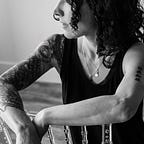Victim or Villain: Two Sides of the Same Coin
How to step outside of the stories you tell yourself
Note: This is a lightly edited version of an essay that originally appeared in my Substack newsletter: Sober Soulful. Find me there for weekly posts, the Early Sobriety series, the Financial Sobriety series, and the Eating & Body series.
During my first year sober, a pivotal practice was taking radical accountability and dropping stories that centered myself as the victim. Writing an 85,000-word (unpublished) memoir was part of this process, helping me to find forgiveness, understand my part, and move on. In the telling of my life — in recounting what they did to me — I couldn’t escape that I was the common denominator.
As my radical accountability guide, I turned to the work of Debbie Ford, who encourages us to ask — whatever the circumstances: What’s my responsibility in this? How did my actions, inactions, reactions, thoughts, emotions, and patterns contribute to where I am now? (1)
The point isn’t to absolve perpetrators or to blame the victims. Nor is it to say that bad things don’t happen for no reason at all. It’s to unravel an exceedingly common tendency among humans to cast ourselves as the victim without tending to the countless (often micro, cumulative) actions and inactions that we did to get here.
This isn’t to say we’re responsible for everything. The question “How am I responsible?” is merely a tool. By getting curious — by…
